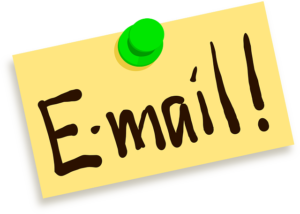WHY COMMUNICATION SKILLS ARE IMPORTANT
Communicating effectively is very important – especially in the workplace. According to NACE (National Association of Colleges and Employers), oral and written communication falls second on the list of competencies that college graduates need for workplace success. That certainly is an indication of how important companies view communication skills. It’s also why communication skills are important.
ORAL COMMUNICATION
It is important to be able to communicate effectively – both inside and outside your organization. When you attend networking events, for example, you are a representative of your organization. As you speak with others, it’s important to be able to convey what your organization does and answer questions that someone may ask. Keep in mind as you’re networking, people may be watching how you interact with others and things have a tendency to get back to companies.
WRITTEN COMMUNICATION
In the world we live in, many people text each other to communicate. When employees are out of the office, you may need to periodically text your boss a short update or send a quick update text to a co-worker. In communicating by text, we try to keep things short and simple. We have a tendency to abbreviate and/or send emojis. If that is the way your organization effectively communicates in certain situations, that’s something you will have to determine. Every organizational culture is different.
However, when it comes to sending a formal email within the organization, it is not professional to communicate the same way you do when texting. Therefore, don’t use abbreviated words and symbols.
As I’ve stated, every organization has its own culture. You will quickly learn your company culture and expectations when it comes to communicating within it.
> Email Etiquette
When sending formal emails within your organization, make sure you know how to write proper emails. Also, keep in mind that writing a formal email is very different than texting. It is not the time to write abbreviations and add your favorite emojis!
1. Showing Respect
When communicating in company emails to – especially higher ups in the organization (President, Vice-President, Board Members, Department Heads, etc.) – you should be more formal by greeting them accordingly and with respect. Starting your email with “Hey Mark” as you would your childhood friend is definitely not appropriate. “Dear Mr. Simpson” shows the respect the person deserves – especially if the person you’re addressing is your boss.
2. Blind Copying Others
Every company has its own culture. When you are working in your specific culture, you will learn how to navigate within it. Personally, as a general rule of thumb, I don’t blind copy on emails. I feel it shows that I’m trying to hide something or get someone into trouble. Therefore, I show the information has been sent to the person by copying them. Now, it depends on the situation and the nature of the email. Sometimes if you want to make sure and share information, it saves you extra time by copying someone than having to send then forward. That is a judgement call on your part. Just remember that when you hit the “send” button, you don’t know where an email can end up. Be very careful about copying others in on information. Think things through before sending information out – especially when sending company-wide.
3. Replying to All
This topic tends to come up quite often when discussing email etiquette. Sometimes it’s just not necessary to “reply to all“. Depending on the given situation, it may be only necessary to respond to the original sender of the email. Sometimes people don’t read details of emails and may miss what is expected. Make sure you read your emails in detail before responding.
4. Reading Carefully
People have a tendency to read only the first two lines of emails – especially when they are long. However, the information included in the rest of the email may be very important information to know. Therefore, read email thoroughly – especially if you must respond to it.
The advice is the same for hard copy correspondence. If you are given a report to read, make sure you pay close attention to the details. Read all company-related emails and correspondence thoroughly. You never know when you may be asked, either face-to-face or in a meeting, about what you were given. If you read and are prepared, you will have the necessary and pertinent information needed to respond accordingly and confidently.
5. Taking Care of Internal Customers
Several years ago, while working in a company’s HR department, it was expected we would respond to emails and voicemail messages within a 24-hour time frame – even if it was just to acknowledge we received the person’s message and were working on their request. Sometimes internal customers can become just as irritated as external customers. When that happens, things can sometimes get blown out of proportion. Try to avoid those situations by acknowledging peoples’ requests even if it’s to say you are currently working on whatever it is they have requested of you. At that point, also give them specifics on when they can expect to hear from you.
Communicating effectively can go a long way within an organization. It can also make you the “go-to” person because you will develop a reputation for someone who gets things done.
ADDITIONAL INFORMATION
For additional information, please feel free to read the following excellent articles:
The Do’s and Don’ts of Email Etiquette
How to Write a Professional Email – Ultimate Guide
ADDITIONAL COMMUNICATION SKILLS
While oral and written communication are very high on the list to be successful in the workplace, there are other communication skills I’d like to discuss as well which are verbal, non-verbal and listening skills.
 VERBAL COMMUNICATIONS IN THE WORKPLACE
VERBAL COMMUNICATIONS IN THE WORKPLACE
Many times in the workplace, people choose to email each other. It’s a quick way of getting information to someone – especially when they are in a different department or building. There is nothing wrong with communicating in that fashion. However, I have found it very effective to communicate face-to-face with someone if I needed to discuss a more serious or troubling work-related matter.
The problem with using emails sometimes is the receiving person can’t judge the tone of voice or attitude of the sender. I have personally seen things taken out of context and miscommunicated through emails simply because the receiver couldn’t judge the attitude of the sender. Therefore, use your own judgement when communicating with others. Instead of sending an email, maybe it’s simply getting up and going to visit the person face-to-face to talk through the situation. It could make a world of difference with getting tasks completed effectively and efficiently.
NON-VERBAL COMMUNICATIONS
There are many things you can do non-verbally to let others know if you are listening. The way you stand, if you are sitting up straight, or have your arms folded across your body can all be signs of whether you’re listening and engaged. This great article Types of Nonverbal Communication discusses different types of nonverbal communication. Being aware of your nonverbals in the workplace can make a difference in how your bosses and co-workers feel when approaching you. Keeping these in mind can also help you as you are interviewing for positions if you plan on being promoted within your organization.
LISTENING SKILLS
How well do you listen to others when communicating? When receiving detailed instructions on how to do something, it is very important to pay attention. Especially when starting a new job, during the training, I always made it a habit to build my own resource manual. I tend to write a lot and take many notes. My note-taking abilities really came in handy as I was learning how to do new tasks. I found my co-workers coming to me many times to receive advice and sometimes to ask for copies of my written notes!
Watch the below video, to obtain ways to listen better:
FINAL THOUGHTS
Oral and written communication falls second on the list of competencies that college graduates need for workplace success. However, the other communication skills are important as well – verbal, non-verbal and listening. One thing to remember is learning how to communicate effectively and efficiently outside of your organization is just as important as internally. This is especially important when attending events where you are representing your organization. Learn how to effectively communicate not only orally but in written format as well, including emails.
I wish you all the best in your career endeavors.
I like to hear from my visitors. Was this article helpful to you?
![]()



18 thoughts on “Why Communication Skills Are Important”
Thank you for another great article. I was wondering if you have recommendations for communication skills for people with learning disorders? My son has dyslexia and expressive processing disorder which means his literacy is at a much younger age than he is. He struggles to compose anything written and his emails come out very short and curt and sometimes difficult to understand. Do you have any tips to make communicating in this format a bit easier?
Megan, thank you for visiting my website and for the comment. My recommendation for someone with dyslexia would be to work with professionals in that field. There is a lot of great information online and two sites you may want to start with are The American Dyslexia Association and the British Dyslexia Association. I am sure there are other sources available, but these may be a good start. Contacting someone for assistance in the area your son needs help with may be a good place to start so he can obtain fundamental communication skills. Once he obtains those skills, it may make communicating a bit easier for him. I hope this information is helpful. I look forward to hearing from you about his progress. Have an awesome week.
Great article and touching on important parts of communication. I myself have made the mistake of sending emails to the wrong people. This can be really embarrassing! Too many people also make the mistake of not spell-checking their emails so they send out (sometimes threatening and criticizing) mails that simply can not be taken seriously because they themselves have not even made the effort of spell-checking.
I love the point that you value face-to-face conversation which really goes a long way over sending out emails. There is a personal touch which you don’t have with emails.
Thank you, Simon, for visiting my website and bringing out some great points. Sending emails out to the wrong people can definitely be embarrassing and what you say about spell-checking is definitely a great point. You should check for spelling especially if it is going company-wide. You certainly don’t look at professional when you send things without first checking.
I’m glad you like the points I made about the face-to-face communication. Personally, I like communicating face-to-face when I can. It can make certain situations so much better in the end. Thanks again for stopping by.
Hi, this is an amazing article that is very useful. I do agree with all your points. I used to lack communication skills and I do suffer a lot because of it. I realized how important it was to sharpen my skills around it. Over time, I have worked on my communication skills and they have greatly improved. Thank you for sharing this, I will share it with others too. Thank you for this amazing post.
Sarah, thank you for visiting and for your comments. I am happy to hear you enjoyed this article. Effective communication is a very important skill set to have and improve upon if it’s not a strength. It’s so great to hear that you have gotten better with your communication skills over time. Thank you so much for sharing that information with us. I hope you continue to improve and communicate effectively with those around you. Please feel free to stop by again to let me know how it’s going.
Funny how you mention the “Reply to All” dilemma. I’ve been at workplaces where everybody uses it – all the time. Eventually you’ll end up with huge chat logs for each message sent, which can be quite annoying, especially if you’re a minimalist like I.
I believe that only those directly concerned should get the message. The fact that my colleagues are having a meeting 200 miles away from my office doesn’t interest me very much, haha.
Thanks for bringing this up. It’s something I’ve been wanting to get off my chest for a while now, and I just wasn’t sure if others felt the same.
Thank you, Mike for your comments and for visiting my site. I know what you mean about people using the “reply all” on a consistent basis. You are correct when you say you’ll end up with huge chat logs and many times it’s just not necessary. I agree that only those directly affected should be in the constant loop of things. I am so glad you were able to clear the air about this. Please feel free to come back anytime to visit.
Communication skills are so important as you have stated. Each situation must use an approach that meets the needs of the communicator and the audience. Sometimes e-mails are great when the information needs to be recalled at a later date in case of a dispute etc, however, I do prefer personal contact so we can get non-verbal cues as to what the other person or persons are thinking and feeling about what is being conveyed.
If we can be taught to communicate effectively at work, these skills will automatically be used to improve our social interactions as well, so everyone wins.
The video on listening by Julian Treasure is great.
Thanks for sharing.
Thank you so much for the kind words and comments. You bring up some great points as well. As you know, whenever possible, I like the personal touch. I like being able to have the person see me and my sincerity if we are in a serious conversation, for example. Sometimes an email just won’t do in certain situations. I think you are right that if you can communicate effectively in one area, it can then translate over into other areas of your life…that is an awesome point. I am glad you liked the video with Julian Treasure. I think he is spot on with his points. Thank you for visiting and I look forward to seeing you again.
Great content! I especially like the part about email etiquette! You have spinned out all the requirements for effective email communication! I would, as well, add a point about “read carefully” which says “avoid prejudgement” as that may kill a business relationship with your clients.
Thank you for stopping by and for your comments. I am glad you enjoyed the article. I would agree with you when saying it’s important to be careful in how you communicate with your clients. Certainly being able to communicate with them effectively will make a huge difference in future business relationships with them. We never want to do or say anything to offend our clients as that could make or break our business. Thank you for bringing that very important point to light. Thank you, once again, for visiting.
This was a great article. Non-verbal communication, to me, is the least effective form of communication since it sends different messages to recipients. I feel oral and written communications are the best forms of communicating in the workplace since they seem to offer more clarity. What are your thoughts? Thank you, Yvette, for your post.
Thank you very much for visiting my site and for your comments. I appreciate it. I think non-verbal communications can indeed send different messages to recipients. However, given the situation, non-verbals can be very apparent. For example, if you are speaking with someone and the person is looking down at their watch, it would let you know right away they are not paying attention to you and don’t feel what you are saying is important. This could make you feel uncomfortable in communicating with them.
While communicating in oral and written forms, people may have a tendency to understand more clearly. However, it depends on the situation. Especially if with written communication in an email, the receiver may not always know how the sender is coming across. The sender may meant to say something in one tone and it just didn’t translate like that to the receiver. That’s when miscommunications happen. I feel each situation needs to be monitored accordingly. Thanks again, for stopping by and for the comments.
Thank you for the excellent tips. I agree it’s more effective to communicate important work-related things face to face because words are often taken out of context and miscommunicated through emails. Also, along with that, non-verbal communication cannot be expressed through email. That’s why I feel email is not always the most effective and efficient way to communicate.
Once again, thank you for the tips.
Thank you so much for stopping by and for the comments. I so agree with you on this and you emphasize some great points. There was a specific time in one of my previous jobs that I decided to go to the person and speak with them face-to-face because of the nature of the topic. After we talked, the person expressed how appreciative they were that I came to speak with them personally. It really made for a much better conversation rather than continuing to go back in forth in an email. So many non-verbal cues are missed when we decide to communicate from behind the keyboard. I feel that people rely so heavily on email, they forget the personal aspects of communication. Thanks again, for stopping by and for the comments. Please come and visit again, soon.
This is great advice! I wish I had it coming out of college. Now that I have been taught how to better do this (through experience), I notice it more.
I see where you talked about people only reading the first few lines, but sending concise emails is also a good thing to live by. Nothing pains me more than asking a closed ended question and getting a novel in return.
Your thoughts?
Thank you, Nate, for stopping by and for your comments. I know what you mean about asking a simple question, but obtaining a novel. I think sometimes people respond certain ways because it’s just their personality to “over explain”. However, I also believe it depends on the given situation. Sometimes it may be necessary to write more when it’s an explanation that needs to be thoroughly documented (for example, for legal purposes). Then on the other hand, it may be very confusing to give too much information. I think each situation should be handled on a case-by-case basis. Thanks, again, for stopping by and for your comments.